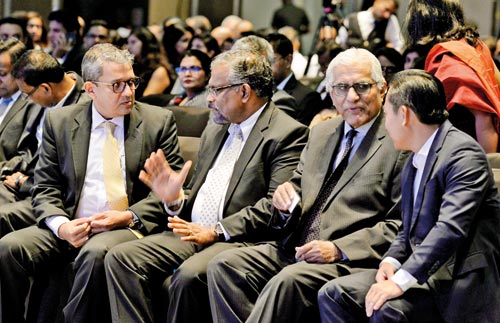Private sector should sensitise itself that SL isn’t out of the woods yet

Invitees at the Economic Summit.
Sri Lanka’s private sector has not internalised the deep trouble the country still is in, despite the relief from the acute hardships faced last year.
“Just because gas is freely available, there are no fuel queues and there isn’t a scarcity of goods, Sri Lanka is not out of the woods. What happens in politics impacts the economy – what happens in the economy impacts politics. There is nothing called an economy, it is just a political economy,” Director General State-Owned Enterprises (SOE) Restructuring Unit Suresh Shah charged noting that it is truly now or never for Sri Lanka.
Treasury Secretary Mahinda Siriwardena, speaking at the Chamber of Commerce economic summit, assured that tax is an area that is closely being watched and that relevant departments have been provided specific instructions for collecting taxes and tax file increases. “It is a combination of policy as well as the administration. I should re-emphasise the fact that it is tax administration that would generate the expected revenue. This is not a sort of single effort.”
Start somewhere
The Treasury’s expectation for economic growth is to come to positive territory, he said, noting the total impact of the tax reforms undertaken this year, can be witnessed next year. The Treasury Secretary said that the measures to enhance the tax framework in the country will focus on administration, compliance, and digitisation. Acknowledging that the issues cannot be resolved overnight, and certain systems and digitalisation have not been implemented fully, he stressed the importance of starting somewhere.
Separately, at a workshop held in Parliament on Monday by the secretarial oversight committee on ‘Elevating the Impact of The Economic Crisis’, Inland Revenue Department officials said that under the existing Inland Revenue Law the annual income report for assessment year 22/23 has to be submitted to the department by November 30th and the failure will result in 5 per cent of the tax payable and Rs. 50,000 fine for those maintaining tax files without meeting the timeline.
Some of Sri Lanka’s labour laws are more than a century old, according to Labour Ministry officials who participated in the second session of the Sri Lanka Economic Summit, which focused on the imperative for state-owned enterprise reforms.
At a panel discussion at the summit, Shan Yahampath, Advisor to Labour Reforms Ministry, said the labour reforms will be three-pronged as far as contributions to SOE reforms are concerned. “The SOES that are under the Companies Act are covered by most of the existing labour laws.”
Friendly labour laws
However, the current labour law excludes state, public, and commercial entities that are established under a written law or an act. “And we plan to include them in the new law under industries and services. We also aim to bring in more friendly labour laws.” He said that trade unionising would see major reforms. For instance, a minimum of 100 members will be needed to register a trade union. “That or a minimum of 25 per cent of the workforce should participate for a trade union to be established,” Mr. Yahampath said. The new law will say that unless 50 per cent of the membership authorises it, a strike cannot take place and it has to be through a ballot. Non-performance is taken into consideration. Also, if trade unions practice anything unfair, they will be taken to task.
Mr. Yahampath also noted that the government should stop being the number one job creator in the country and shouldn’t be the protector of jobs as well. “Instead, the government should protect its citizens. A social protection programme for the citizens should be set up an unemployment insurance scheme, which should be contributory. It is also important to get more females to participate in the workforce by changing discriminatory labour laws that discourage female workforce participation.”
Panellist Minister of Power and Energy Kanchana Wijesekera said that the energy reforms are a near 3-year process. Acknowledging the elections in the coming year, he said the Electricity Sector Reform Bill needs to be passed before that. Noting that human resources management in both electricity and energy sector is tricky that international benchmarks and the regional private sector operators have to be evaluated for understating the requirements, and he pointed out that generation company LTL Pvt Ltd is one who operates efficiently in electricity sector in Sri Lanka with lesser staff.
He said the ministry scrapped bonuses of Ceylon Electricity Board (CEB) and Ceylon Petroleum Corporation (CPC) last year and the 25 per cent salary increment irrespective of performance, and will go for performance-based increments which will encourage younger and efficient cardre in the system.
CPC’s permanent cadre will undergo a restructure and the ministry will look at outsourcing some of the services of both CPC and CEB. The ministry has commenced a forensic audit, dispatch audit and HR audit to see how to do the reforms in the CEB and CPC. “The biggest challenge we have is that there is no past data or accurate data,” Mr. Wijesekera said.
Hitad.lk has you covered with quality used or brand new cars for sale that are budget friendly yet reliable! Now is the time to sell your old ride for something more attractive to today's modern automotive market demands. Browse through our selection of affordable options now on Hitad.lk before deciding on what will work best for you!


